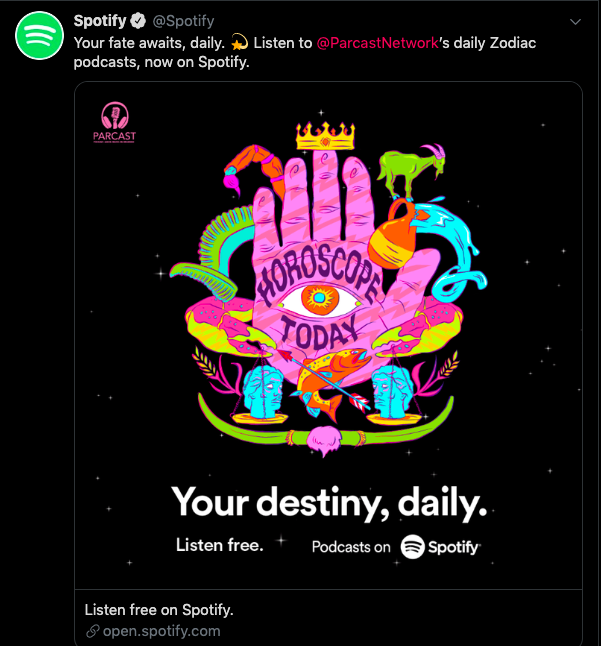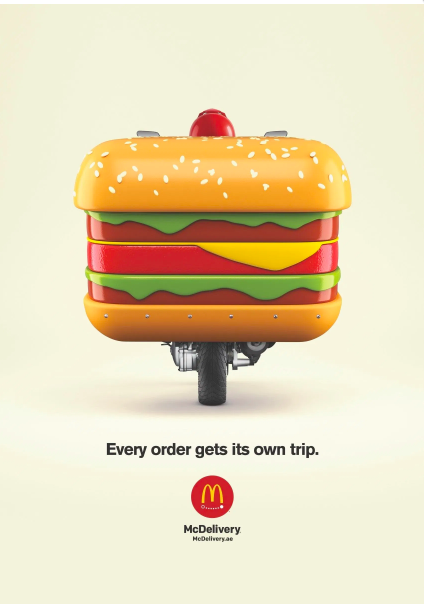“Disgraceland” by Jake Brennan has been one of my favorite podcasts since the first episode. Last year, it got a feature in The Boston Globe, where the primary audience is between the ages of 50 and 69, and 48% male. These are the kinds of numbers you won’t see about Twitter — an app 24% of adults use. But because of this mix of traditional and digital marketing, “Disgraceland” has over 100 million downloads for a podcast that’s less than two years old.
The debate between traditional and digital marketing is long and lasting. It ultimately comes down to which one fits the needs of your company. When trying to choose between traditional and digital marketing, why not look at both?
What is Traditional Marketing?
Traditional marketing refers to any type of marketing that isn’t online. This means print, broadcast, direct mail, phone, and outdoor advertising like billboards. From newspapers to radio, this method of marketing helps reach targeted audiences.

Image source: Ads of the World
Traditional marketing is not only one of the oldest forms of marketing, but also one of the most researched. Marketers lean towards this method because it’s tried and true. Everyone encounters some sort of traditional marketing in their everyday lives, whether it’s getting the mail or your daily newspaper.
Traditional marketing plays an important part in reaching local audiences. Ads can be kept for a long period of time, if they’re physical. Plus, there’s an audience who’s easier to reach through traditional marketing than online marketing.
What is Digital Marketing?
Inversely, digital marketing is … well … digital. Digital marketing is any marketing a company conducts online, such as paid social media ads, email marketing, and PPC advertising. Digital marketing has become wildly popular due to the cultural, technological, and societal shifts around us.
Promoted tweets, influencer trips, and Tasty videos are all examples of digital marketing and how expansive it’s become. Even Googling “What is TikTok?” is evidence of effective digital marketing.
As the world becomes more digital, the way we market has evolved. Not only is digital marketing sometimes more cost-effective than traditional, but also it is a more direct way to connect with target audiences globally.

Image source: Twitter
Digital marketing is essential for businesses today. It’s become routine for consumers to conduct research and make purchases online. Just this week, I’ve looked up lunch spots, priced couches, and picked an eye doctor — all using the internet.
With all this information, which route should your company go with?
There are a few disadvantages to traditional marketing. First, businesses have little to no interaction with the consumers they are selling their products to in real time. You can’t Twitter DM a Macy’s ad to ask if the grey duvet covers will be available in your store.
Some marketers also see traditional marketing as unreliable. You can’t edit a print ad once it’s out. So, if you recorded the wrong percentage discount on that sale radio ad you recorded, you can’t change it.
Traditional marketing can also be pricier. For instance, it can cost between $2,000-$160,000 to run a print ad. Further, you never know who you’ll reach with that investment because results are difficult to measure. Marketers can’t drive more people to read The New Yorker or watch “The Masked Singer” — and they can’t boost those ads if they’re performing well.

Image source: Campaigns of the World
Image Source: McDonald's
Traditional marketing is still a realistic and important way to market certain businesses. But digital marketing is an increasingly important revenue driver. In fact, businesses reported that half of revenue is influenced by social selling.
Recently, 50% of marketers said they believe digital marketing has an edge over traditional because of the interaction digital marketing opens with customers. Businesses can have full control of their audience growth and see real-time results of each facet of that campaign. And with inbound marketing, consumers find the business, not the other way around.
Disadvantages to digital marketing do exist, however. Digital marketing depends on technology and, sometimes, technology breaks. When social media sites go down and a social media marketer has posts scheduled to go live, the only solution is to wait it out.
Another issue social media sites have begun to face has to do with security. Since the Facebook scandal in which the private information contained in 87 million profiles was leaked, other platforms have taken strict measures to make sure users’ information is private. But businesses have to keep in mind the legalities of their marketing, too.
Every update to a social platform means a new learning curve for developers and marketers. These are curves that take time out of your workday to learn and incorporate into future strategies.
Can They Work Together?
In short, absolutely. It’s a debate as old as time, and the subject will continue to be debated for many years to come. But there’s a time and a place for both marketing strategies.
Let’s go back to that Macy’s example. No, you can’t DM a Macy’s print ad, but you can follow them on socials and sign up for their automated emails. This way, the older woman who prefers flyers and coupons in the mail — like my mother — and her millennial daughter, who prefers social media marketing, receive the same information.

Image source: Macy’s
Have you ever used traditional marketing to heighten digital marketing? To illustrate, the classifieds section of your local Sun-Times paper might now include “For more information about this job, check out our listing on Indeed.” The effect of this would be local applicants checking the paper for opportunities — and then learning more online.
The question shouldn’t be “To traditional market or to digital market?” Instead, try “How do we use both tactics to market effectively?” Of course, some businesses may benefit from going one way or the other, but on the whole, it is possible for both methods to thrive harmoniously.
from Marketing https://ift.tt/2lh3t1J

No comments:
Post a Comment